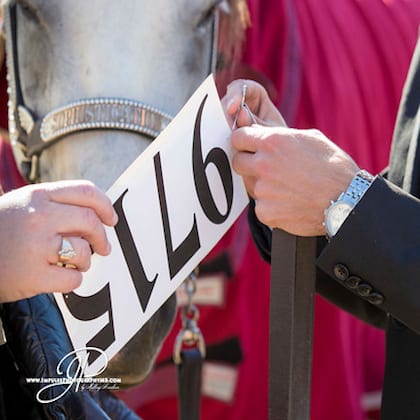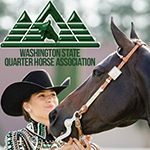GoHorseShow was recently inspired by a Stacy Westfall article titled, “The first horse I refused to train.” In this article, Westfall took a horse for 30 days of training against her better judgement. The horse was dangerous and the owner was unrealistic and she sent it home. We wanted to expand on this article and learn from other trainers and their experiences. How do they screen potential customers and what are their current guidelines as far as when they say “No” to taking new horses and customers? They also offer valuable advice for other trainers.
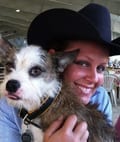 Joni Nelson–I can say it in just a few words–be honest. Honest about the horse, the abilities, the goals, the customers abilities. Everything! They may not like what you have to say but in the long run you will be happier and so will they. You don’t want to waste a person’s money or your time on one you don’t want to help/train. You need to want to get horses you want to ride each day. Not just to sit there and take the money and the customer not get what they want. As we all have heard–honesty is the best policy, and we run our business by this motto.
Joni Nelson–I can say it in just a few words–be honest. Honest about the horse, the abilities, the goals, the customers abilities. Everything! They may not like what you have to say but in the long run you will be happier and so will they. You don’t want to waste a person’s money or your time on one you don’t want to help/train. You need to want to get horses you want to ride each day. Not just to sit there and take the money and the customer not get what they want. As we all have heard–honesty is the best policy, and we run our business by this motto.
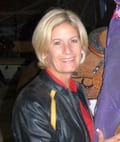 Karen Graham–Never take on more horse than you can handle! I let a man talk me into training a Quarter Horse Race Horse to make a Supreme Champion. When he unloaded him, it was a rank stallion with no manners that had a throat latch that did not have any bend. I was in my 20s and only weighed 100 lbs. On the first and only ride I put on him, he galloped for 30 minutes at full speed through the desert with me pulling every way I could to stop. Lesson learned. I was no match for that horse no matter how I thought I could train him, and I had a very long time galloping out of control to think about it!
Karen Graham–Never take on more horse than you can handle! I let a man talk me into training a Quarter Horse Race Horse to make a Supreme Champion. When he unloaded him, it was a rank stallion with no manners that had a throat latch that did not have any bend. I was in my 20s and only weighed 100 lbs. On the first and only ride I put on him, he galloped for 30 minutes at full speed through the desert with me pulling every way I could to stop. Lesson learned. I was no match for that horse no matter how I thought I could train him, and I had a very long time galloping out of control to think about it!
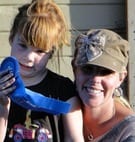 Kellie Hinely–I have learned to discuss goals and expectations of both the horse and myself up front. If I don’t think that the owner’s expectations meet what I think that I can produce, I explain my concerns and the customer can make an educated decision. I have also made the phone call a few weeks into training to let the owner know that their horse may not be suitable for their goals. As far as taking new customers in, just as they interview me, I interview them. I have a great group of customers and it is important that a new member is a team player and wants to “get along” with the group. I tell them that I don’t think they are a match for my program and give them suggestions of other trainers that may suitable. I take a big group of horses and clients to the shows and don’t have time for drama. Horse showing is hard work but it also needs to be fun!
Kellie Hinely–I have learned to discuss goals and expectations of both the horse and myself up front. If I don’t think that the owner’s expectations meet what I think that I can produce, I explain my concerns and the customer can make an educated decision. I have also made the phone call a few weeks into training to let the owner know that their horse may not be suitable for their goals. As far as taking new customers in, just as they interview me, I interview them. I have a great group of customers and it is important that a new member is a team player and wants to “get along” with the group. I tell them that I don’t think they are a match for my program and give them suggestions of other trainers that may suitable. I take a big group of horses and clients to the shows and don’t have time for drama. Horse showing is hard work but it also needs to be fun!
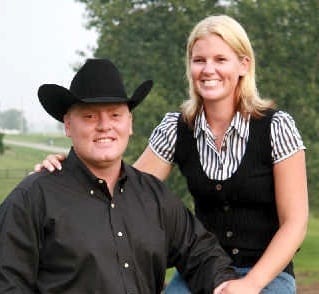 Darla Lee–My husband and i usually take in any horse for at least a 30 day trial. Most of the time we know in that time whether it is smart (for our time and their money) to continue or not. It is very hard to tell people that their horse is not going to work out, but most likely they will eventually be unhappy later anyway after they have just spent more money. There is always the hope that you can either make the horse come around or convince the customer to get a horse that will work out better for them. Horses and people can really surprise you, in good ways and bad– we just all seem to be so hopeful that it will end up well that we take the risk. My husband is the best at reading customers. When a new customer drops off a horse he usually tells me, “I have a great feeling about this,” or “This is going to be a train wreck.” A lot of the time I disagree with him hoping for the best in horses and people, but 99.9% of the time he is right and has to tell me later, “I told you so.” My advice for other trainers is advice we received from our predecessors. Don’t be afraid to tell your customers what you think. They are paying for your opinion. Some owners don’t like to hear the truth but in the end they will understand, although it may be quite a while later, or in Stacy’s case maybe never. And its always better to under promise and over deliver. I would also caution owners to trainers that promise a lot in the beginning, none of us can predict what will happen with any horse. We can tell you what we think will happen but we can be wrong too.
Darla Lee–My husband and i usually take in any horse for at least a 30 day trial. Most of the time we know in that time whether it is smart (for our time and their money) to continue or not. It is very hard to tell people that their horse is not going to work out, but most likely they will eventually be unhappy later anyway after they have just spent more money. There is always the hope that you can either make the horse come around or convince the customer to get a horse that will work out better for them. Horses and people can really surprise you, in good ways and bad– we just all seem to be so hopeful that it will end up well that we take the risk. My husband is the best at reading customers. When a new customer drops off a horse he usually tells me, “I have a great feeling about this,” or “This is going to be a train wreck.” A lot of the time I disagree with him hoping for the best in horses and people, but 99.9% of the time he is right and has to tell me later, “I told you so.” My advice for other trainers is advice we received from our predecessors. Don’t be afraid to tell your customers what you think. They are paying for your opinion. Some owners don’t like to hear the truth but in the end they will understand, although it may be quite a while later, or in Stacy’s case maybe never. And its always better to under promise and over deliver. I would also caution owners to trainers that promise a lot in the beginning, none of us can predict what will happen with any horse. We can tell you what we think will happen but we can be wrong too.
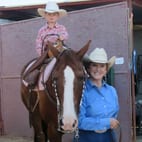 Cynthia Cantleberry–When you get someone who says, “I only want 30 days”, the way to handle that is to have them bring the horse out to be evaluated – not just dropped off – to make sure that you can make a difference in that horse within those 30 days. Let them know you have to do an evaluation and then you’ll decide whether or not you can keep the horse. That way you can evaluate the owner too. But, if at all possible, do not take horses for 30 days, unless they are already started and have a good foundation. In 30 days, you usually can’t make them great, but you can make them better. In Stacy’s story, she was just starting out and needed the money, so she said, “Yes”, against what she really wanted to do. If this situation comes up and you are in the same shoes, one way to think about it is if you get hurt, or if your reputation gets hurt because you can’t meet a person’s unrealistic expectations, is that it will cost you a lot more than the 30 day training bill. It just isn’t worth it.
Cynthia Cantleberry–When you get someone who says, “I only want 30 days”, the way to handle that is to have them bring the horse out to be evaluated – not just dropped off – to make sure that you can make a difference in that horse within those 30 days. Let them know you have to do an evaluation and then you’ll decide whether or not you can keep the horse. That way you can evaluate the owner too. But, if at all possible, do not take horses for 30 days, unless they are already started and have a good foundation. In 30 days, you usually can’t make them great, but you can make them better. In Stacy’s story, she was just starting out and needed the money, so she said, “Yes”, against what she really wanted to do. If this situation comes up and you are in the same shoes, one way to think about it is if you get hurt, or if your reputation gets hurt because you can’t meet a person’s unrealistic expectations, is that it will cost you a lot more than the 30 day training bill. It just isn’t worth it.
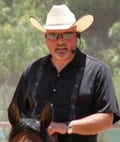 Michael Damianos–I always ask the client what are their goals with their horse. If they are not sure, I try to listen to them and help them establish goals. At that point, I must decide if those goals are potentially attainable with their horse. If they are, I explain what is entailed in pursuing those goals. At that point, I have a good idea whether we can work together and so does the horse owner. The horse trainer needs to listen to the owner and the owner needs to listen to the trainer. If I do not think that type of relationship will exist, I tell the owner I am not the right trainer for them.
Michael Damianos–I always ask the client what are their goals with their horse. If they are not sure, I try to listen to them and help them establish goals. At that point, I must decide if those goals are potentially attainable with their horse. If they are, I explain what is entailed in pursuing those goals. At that point, I have a good idea whether we can work together and so does the horse owner. The horse trainer needs to listen to the owner and the owner needs to listen to the trainer. If I do not think that type of relationship will exist, I tell the owner I am not the right trainer for them.
 Missy Thyfault–I will say no to a horse that is dangerous. In using the word dangerous, I consider one that comes in rearing, laying down, bolting or not within my comfort zone. I am even quicker to say, “No” if it is meant to be a child’s horse and I am not comfortable with the fit. I also would pass on a customer who has goals that I feel aren’t attainable. Usually, this is due to talent and trainability level of the horse to the goals desired. I feel there are some parents who live vicariously through their children’s horse showing to the point that it becomes obsessive in regards to the winning. Don’t get me wrong, I love to win, but I feel that learning all the aspects of becoming a great horseman have value as well. I do believe it is about the journey and how we get there and that makes the winning that much sweeter. And winning isn’t instantaneous, it takes many hours of experience and hard work to get there. I have great parents who understand that and are great team players. Someone who causes excessive “drama” in the barn atmosphere is weeded out as well. It can be an easy enjoyable experience if its right. And I do feel its my responsibility to try and keep a healthy and happy barn atmosphere.
Missy Thyfault–I will say no to a horse that is dangerous. In using the word dangerous, I consider one that comes in rearing, laying down, bolting or not within my comfort zone. I am even quicker to say, “No” if it is meant to be a child’s horse and I am not comfortable with the fit. I also would pass on a customer who has goals that I feel aren’t attainable. Usually, this is due to talent and trainability level of the horse to the goals desired. I feel there are some parents who live vicariously through their children’s horse showing to the point that it becomes obsessive in regards to the winning. Don’t get me wrong, I love to win, but I feel that learning all the aspects of becoming a great horseman have value as well. I do believe it is about the journey and how we get there and that makes the winning that much sweeter. And winning isn’t instantaneous, it takes many hours of experience and hard work to get there. I have great parents who understand that and are great team players. Someone who causes excessive “drama” in the barn atmosphere is weeded out as well. It can be an easy enjoyable experience if its right. And I do feel its my responsibility to try and keep a healthy and happy barn atmosphere.
 Anne Shafer–I have come to realize through past experience that horse trainers are like doctors. We can do a little bit of everything if we have too, but we all eventually specialize in what, and how we train. I figured this out when I was training in Wyoming years ago. When I first set up shop, everyone wanted to bring me the rankest horse that they had for me to break and train. I guess if you need the money bad enough you will take anything that comes along. So now in my contract for training, any horse that comes in the barn for training, has to stay at least 90 days and if it is a young one, I will put the ground work on it, but I have a young man that will come over and ride them for a week or two and get the silliness out of them before I step on. I have also found that most of the people who want the 30 miracle training on a horse really do not understand what is involved in starting a horse correctly, and that 30 days does not mean you ride the colt for 30 days straight when they have had nothing done with them up to that period of time.
Anne Shafer–I have come to realize through past experience that horse trainers are like doctors. We can do a little bit of everything if we have too, but we all eventually specialize in what, and how we train. I figured this out when I was training in Wyoming years ago. When I first set up shop, everyone wanted to bring me the rankest horse that they had for me to break and train. I guess if you need the money bad enough you will take anything that comes along. So now in my contract for training, any horse that comes in the barn for training, has to stay at least 90 days and if it is a young one, I will put the ground work on it, but I have a young man that will come over and ride them for a week or two and get the silliness out of them before I step on. I have also found that most of the people who want the 30 miracle training on a horse really do not understand what is involved in starting a horse correctly, and that 30 days does not mean you ride the colt for 30 days straight when they have had nothing done with them up to that period of time.
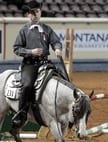 Chad Evans–I do have a funny story about a “less than stable” new customer that didn’t even make it to the 30 day trial period. Shortly after taking a horse in training, I was discussing with the owner that the horse was was progressing but that it was having difficulty bending to the right. The owner called the next day and explained that when the horse was a two year-old it had got its bit stuck in a starting gate at a race track and that is why it was having a hard time bending to the right. Then, I asked if she had talked to previous owner to find this out and she replied, “No, she sent it to me in a dream last night…” Needless to say, we did have the “maybe this isn’t the right fit” talk–the basis of it being that we want to create a partnership that works together and I didn’t think we were the right fit. The lady appreciated the honesty and gave me a bag of almonds as a parting gift! On a more serious note, I do always have a pre-meeting where we discuss their goals and the structure of our training program to hopefully let them get a good grasp of what to expect. We do a 30 day trial period that I utilize to evaluate their horse and also allow them to get an understanding of our program.
Chad Evans–I do have a funny story about a “less than stable” new customer that didn’t even make it to the 30 day trial period. Shortly after taking a horse in training, I was discussing with the owner that the horse was was progressing but that it was having difficulty bending to the right. The owner called the next day and explained that when the horse was a two year-old it had got its bit stuck in a starting gate at a race track and that is why it was having a hard time bending to the right. Then, I asked if she had talked to previous owner to find this out and she replied, “No, she sent it to me in a dream last night…” Needless to say, we did have the “maybe this isn’t the right fit” talk–the basis of it being that we want to create a partnership that works together and I didn’t think we were the right fit. The lady appreciated the honesty and gave me a bag of almonds as a parting gift! On a more serious note, I do always have a pre-meeting where we discuss their goals and the structure of our training program to hopefully let them get a good grasp of what to expect. We do a 30 day trial period that I utilize to evaluate their horse and also allow them to get an understanding of our program.
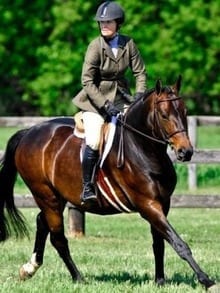 Lainie DeBoer–When I was younger I would take whatever horses and clients that would call. I was not picky at all just needed to pay the bills, and I was obsessed with taking as many as I could to the horse show. I was extremely unhappy with myself and my business. I actually had a barn full and let them all go so I could start from scratch and build my business on my terms with the right people and horses, with the help of a life coach and my family’s blessing. Although there were lean times, it was the best decision I have ever made. Now, I take clients and horses that fit into my program and my ideology. Although those years of dealing with difficult horses and clients were not fun, it did teach me a lot. I think you learn more about yourself and the type of trainer you want to become in times like that. It’s a bit like puberty, I would never want to go through it again, but it was necessary. I am not sure if it’s being a mother to two beautiful girls or a bit older and wiser, but I have been very careful to make good choices. Now I have a small business with a couple of long term clients that are amazing. A very successful trainer, Kip Rosenthal, said to me, “When we train, we take all of our experiences and put them into a treasure chest. As we grow older our chest gets bigger and bigger. With that we can have more and more to draw out of our chest of experiences to make the right decisions.”
Lainie DeBoer–When I was younger I would take whatever horses and clients that would call. I was not picky at all just needed to pay the bills, and I was obsessed with taking as many as I could to the horse show. I was extremely unhappy with myself and my business. I actually had a barn full and let them all go so I could start from scratch and build my business on my terms with the right people and horses, with the help of a life coach and my family’s blessing. Although there were lean times, it was the best decision I have ever made. Now, I take clients and horses that fit into my program and my ideology. Although those years of dealing with difficult horses and clients were not fun, it did teach me a lot. I think you learn more about yourself and the type of trainer you want to become in times like that. It’s a bit like puberty, I would never want to go through it again, but it was necessary. I am not sure if it’s being a mother to two beautiful girls or a bit older and wiser, but I have been very careful to make good choices. Now I have a small business with a couple of long term clients that are amazing. A very successful trainer, Kip Rosenthal, said to me, “When we train, we take all of our experiences and put them into a treasure chest. As we grow older our chest gets bigger and bigger. With that we can have more and more to draw out of our chest of experiences to make the right decisions.”
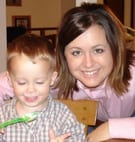 Julie Vogue–In my program, trust and try are the key elements for both customers and horses. As soon as either horse or owner lacks either part, they are recommended to someone else that will fit them better. I will give anyone or any horse a chance as you can’t always believe the rumors and gossip that goes around.
Julie Vogue–In my program, trust and try are the key elements for both customers and horses. As soon as either horse or owner lacks either part, they are recommended to someone else that will fit them better. I will give anyone or any horse a chance as you can’t always believe the rumors and gossip that goes around.
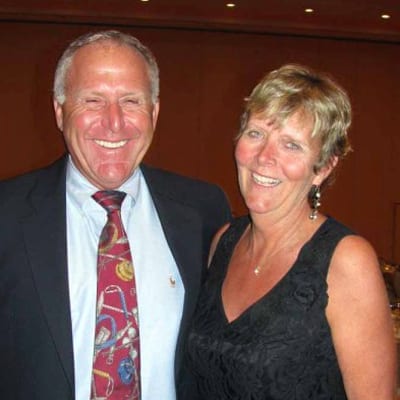 Larry Spratto–When I get a phone call from someone new looking for training, a big red flag for me is if they start bad mouthing all their previous trainers. I have never had much luck with people like this and they usually do not last long in my program. The ones who complain the most about being lied to in the past, usually are the ones who do not accept the honest truth about their horse’s capabilities in the show arena, or in the training schedule. They get mad and leave, and the same cycle starts over again.
Larry Spratto–When I get a phone call from someone new looking for training, a big red flag for me is if they start bad mouthing all their previous trainers. I have never had much luck with people like this and they usually do not last long in my program. The ones who complain the most about being lied to in the past, usually are the ones who do not accept the honest truth about their horse’s capabilities in the show arena, or in the training schedule. They get mad and leave, and the same cycle starts over again.
 Ashley Lakins–Don’t always go by first impression. If there is a chance, take a young horse and give it a months training and then make your final decision. Some horses will really surprise you.
Ashley Lakins–Don’t always go by first impression. If there is a chance, take a young horse and give it a months training and then make your final decision. Some horses will really surprise you.


